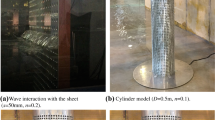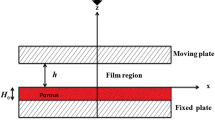Abstract
The literature includes a variety of analytical and semi-analytical models to describe squeeze-film dam** in MEMS perforated structures. Even if many of them have been validated by means of numerical simulations, nobody seems to have discussed about the accuracy of numerical approaches in this field. In the present paper, we apply both the main analytical models and a commercial finite element software, COMSOL Multiphysics, to solve a good number of squeeze-film problems. They refer to some cases, which were experimentally investigated during the past by different authors. The tested structures are rigid rectangular plates fabricated with different material, different perforation ratio (i.e., the ratio of the hole side to the holes pitch) and different number of perforations. We compare both the analytical and the numerical results with the available experimental data, in order to have an overview about their effectiveness. Numerical simulations offer in all the considered cases valuable agreement with experiments.




Similar content being viewed by others
Notes
Only the last updated formulations are herein considered.
In the numerical simulations, rarefaction is modeled through the formulation proposed by Veijola and Raback (2007).
References
Bao M, Yang H (2007) Squeeze film air dam** in MEMS. Sens Actuators A 137:3–27
Bao M, Yang H, Sun Y, French PJ (2003) Modified Reynolds’ equation and analytical analysis of squeeze-film air dam** of perforated structures. J Micromech Microeng 13:795–800
De Pasquale G, Veijola T, Soma A (2009) Gas dam** effect on thin vibrating gold plates: experiments and modeling. In: Proceedings on Symposium of DTIP of MEMS/MOEMS, Rome, Italy, pp 23–28
De Pasquale G, Veijola T, Somà A (2010) Modelling and validation of air dam** in perforated gold and silicon MEMS plates. J Micromech Microeng. doi:10.1088/0960-1317/20/1/015010
Homentcovschi D, Miles RN (2010) Viscous dam** and spring force in periodic perforated planar microstructures when the Reynold’s equation cannot be applied. J Acoust Soc Am 127(3):1288–1299
Homentcovschi D, Murray BT, Miles RN (2010) An analytical formula and FEM simulations for the viscous dam** of a periodic perforated MEMS microstructure outside the lubrication approximation. Microfluid Nanofluid 9:865–879
Kim E-S, Cho Y-H, Kim M-U (1999) Effect of holes and edges on the squeeze film dam** of perforated micromechanical structures. In: 12th IEEE international conference on micro electro mechanical systems (MEMS ‘99), pp 296–301
Kwok PY, Weinberg MS, Breuer KS (2005) Fluid effects in vibrating micromachined structures. J Microelectromech Syst 14:770–781
Landau L, Lifchitz E (1971) Méchanique des Fluides. Editions MIR, Moscow
Lee JW, Tung R, Raman A, Sumali H, Sullivan JP (2009) Squeeze-film dam** of flexible microcantilevers at low ambient pressures: theory and experiment. J Micromech Microeng 19. doi:10.1088/0960-1317/19/10/105029
Mohite SS, Kesari H, Sonti VR, Pratap R (2005) Analytical solutions for the stiffness and dam** coefficients of squeeze films in MEMS devices with perforated back plates. J Micromech Microeng 15:2083–2092
Mohite SS, Sonti VR, Pratap R (2006) Analytical model for squeeze-film effects in perforated MEMS structures including open border effects. In: Proceedings of XX EUROSENSORS 2006, 20th Anniversary, Goteborg, Sweden, vol II, pp 154–155
Nigro S, Pagnotta L, Pantano MF (2010) Evaluation of the squeeze-film dam** effects in MEMS perforated plates. In: 8th IASME/WSEAS international conference on fluid mechanics and aerodynamics, Taipei, Taiwan, pp 314–319
Pandey AK, Pratap R (2008) A comparative study of analytical squeeze film dam** models in rigid rectangular perforated MEMS structures with experimental results. Microfluid Nanofluid 4:205–218
Skvor Z (1967–1968) On acoustical resistance due to viscous losses in the air gap of electrostatic transducers. Acustica 19:295–297
Somà A, De Pasquale G (2008) Numerical and experimental comparison of MEMS suspended plates dynamic behaviour under squeeze film dam** effect. Analog Integr Circ Sig Process 57:213–224
Starr JB (1990) Squeeze-film dam** in solid-state accelerometers. In: IEEE Workshop on Solid-state Sensor and Actuator, Hilton Head Island, SC, USA, pp 44–47
Veijola T (2006) Analytic dam** model for an MEM perforation cell. Microfluid Nanofluid 2:249–260
Veijola T, Raback P (2007) Methods for solving problems in perforated microstructures using a 2D finite-element solver. Sensors 7:1069–1090
Veijola T, De Pasquale G, Soma A (2009) Experimental validation of compact dam** models of perforated MEMS devices. Microsyst Technol 15:1121–1128
Author information
Authors and Affiliations
Corresponding author
Rights and permissions
About this article
Cite this article
Nigro, S., Pagnotta, L. & Pantano, M.F. Analytical and numerical modeling of squeeze-film dam** in perforated microstructures. Microfluid Nanofluid 12, 971–979 (2012). https://doi.org/10.1007/s10404-011-0931-1
Received:
Accepted:
Published:
Issue Date:
DOI: https://doi.org/10.1007/s10404-011-0931-1




